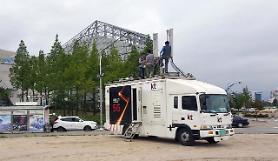
[Gettyimages Bank]
Wi-Fi is a popular wireless networking technology that uses radio waves to provide wireless high-speed Internet and network connections. Currently, free Wi-Fi services were provided in public places such as subway stations and shopping malls frequently used by citizens.
Ministry of Science and ICT said in a statement that through an information and communication strategy committee meeting in Seoul on Monday, the government has established a plan to promote digital engagement.
"Beyond simply increasing access to information for the disconnected and underprivileged, the government will overhaul the entire digital environment so that all citizens can be motivated to participate in the digital society and enjoy digital benefits," the science ministry said.
The government's big picture to narrow the information gap between the underprivileged people and other citizens includes the installment of some 41,000 free WiFi access points at public places including village offices and community centers as well as connecting some 1,300 remote villages located in hard-to-reach places such as in the mountains with high-speed internet lines by 2022.
South Korea with a population of about 51.78 million has more than 51 million smartphones. However, there are still people who do not get access to internet or smartphones. The government will start the distribution of smartphones by providing 10,000 free devices and mobile data subscription fees for elderlies and the disabled. Various classes will also be operated to help people to use their smartphones effectively.
Also, using the country's vast network of 4G, 5G and internet of things (IoT), the government will also provide home IoT sensors that are capable of detecting movement, monitor respiratory activity and pulse at community shelters and homes where elderlies and the people with disabilities live.
In October last year, Seoul with a population of 9.1 million revealed its plan to build smart city infrastructure densely so that citizens can reduce the burden of communication costs. The public IoT network will be expanded throughout Seoul, allowing citizens to use services such as shared parking and smart street lighting using IoT sensors.
Seoul would establish its own optical cable communication network called "S-Net" covering 4,237 kilometers (2,627 miles) by 2022, without leasing lines of private mobile network providers. If a self-communication network is established, unlimited connectivity to all administrative areas is possible.
The city will expand free public Wi-Fi services in all areas by increasing the number of wireless transmission and reception devices (APs) from 7,420 to 23,750 in 2022. Additional public Wi-Fi APs will be installed first at bus stations, transportation facilities and CCTV support systems to reduce costs and make citizens feel more comfortable at an early date.
Copyright ⓒ Aju Press All rights reserved.


